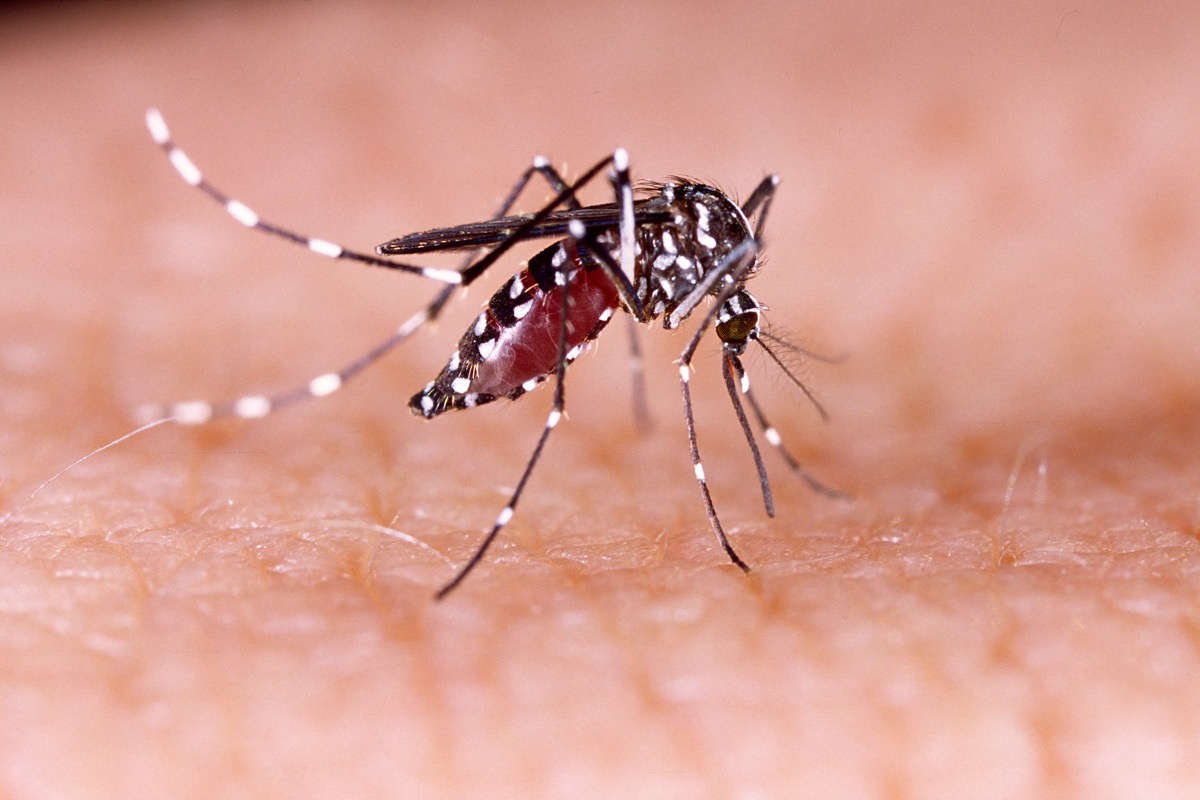If You Live Here, Prepare for a Mosquito Invasion Like You’ve Never Seen

As we round the corner of spring, we can really start looking forward to summer and the bright, sunny weather. However, along with longer days and plenty of warmth, summer also brings swarms of mosquitoes. For most people, these pests are manageable, but one state will see a hoard of mosquitoes this season like they’ve seen before. Officials plan to release about 140,000 genetically modified mosquitoes here in the coming weeks. Read on to find out if you’ll be subjected to tens of thousands of new mosquitoes, and for more pests to be aware of, If You See This Bug in Your Home, Don’t Step on It, Experts Warn.
Genetically modified mosquitoes are being released in Florida.

If you’re a Florida Keys resident or plan to visit the spot this summer, prepare to see more mosquitoes than you’re used to. On April 23, Oxitec announced in a statement that they would be releasing genetically modified mosquitoes into the wild in the Florida Keys. Oxitec is a U.K.-based biotechnology company that develops genetically modified insects to assist in insect control. According to the statement, the goal of releasing these modified mosquitoes is to diminish the population of female Aedes aegypti mosquitoes, which can carry diseases, including dengue, yellow fever, Zika, and chikungunya. Reducing the population of these disease-carrying mosquitoes will aid in public health efforts to minimize outbreaks.
The mission “is to protect residents in the Florida Keys from the disease-transmitting mosquito, Aedes aegypti,” Andrea Leal, Executive Director of Florida Keys Mosquito Control District, said in the statement. “As we are seeing the development of resistance to some of our current control methods, we are in need of new tools to combat this mosquito. And given the unique ecosystem we live in, those tools need to be safe, environmentally friendly, and targeted.” And for more insects that are close to home, check out these 5 Things You’re Buying That Bring Bed Bugs Into Your House, Experts Say.
The existing mosquito species can transmit diseases to humans and pets.

The Aedes aegypti mosquito makes up about 4 percent of the mosquito population in the Florida Keys, but is responsible for almost all mosquito-borne diseases transmitted to humans, according to the statement. Not only can these mosquitoes transmit various diseases to humans, but they can also transmit heartworm and other potentially life-threatening diseases to pets. Releasing the modified mosquitoes will help weed out this dangerous species.
“Oxitec’s non-biting male mosquitoes will emerge from the boxes to mate with the local biting female mosquitoes. The female offspring of these encounters cannot survive, and the population of Aedes aegypti is subsequently controlled,” the statement explained. And for another burst of bugs on the horizon, If You Live Here, Prepare for a Major Bug Infestation, Expert Warns.
They plan to release about 144,000 mosquitoes, but have permission to release millions.

The first box containing these mosquitoes will be sent out on April 26, and the insects will begin to emerge in May, according to the statement. There will be two boxes on Cudjoe Key, one on Ramrod Key, and three on Vaca Key. About 12,000 mosquitoes will be released across all of the locations for 12 weeks, totaling around 144,00 mosquitoes. Oxitec has permission to release 750 million mosquitoes, according to The Hill, but they don’t plan to get near that amount. The project was approved by the U.S. Environmental Protection Agency (EPA) and the State of Florida Department of Agriculture and Consumer Services (FDACS), and has support from the U.S. Centers for Disease Control and Prevention (CDC) and an independent advisory board. And for more bug news delivered straight to your inbox, sign up for our daily newsletter.
Similar genetically modified mosquito projects in Brazil were successful.

Similar projects were carried out in Indaiatuba, a city in Brazil. Oxitec’s mosquitoes suppressed disease-carrying Aedes aegypti by a two-week rolling average of 95 percent in “urban, dengue-prone environments following just 13 weeks of treatment, as compared to untreated control sites in the same city,” per the statement. Officials are hoping to have similar success in the Florida Keys. And for signs of imminent insect arrival, If You See This in Your Yard, Prepare for a Bug Invasion, USDA Says.